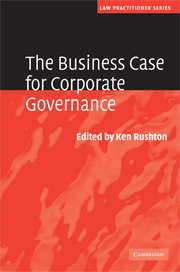Book contents
- Frontmatter
- Contents
- List of contributors
- Acknowledgements
- Introduction
- 1 The role of the board
- 2 The role of the Chairman
- 3 The role of the non-executive director
- 4 The role of the Company Secretary
- 5 The role of the shareholder
- 6 The role of the regulator
- 7 Directors’ duties
- 8 What sanctions are necessary?
- 9 Regulatory trends and their impact on corporate governance
- 10 Corporate governance and performance: the missing links
- 11 Is the UK model working?
- Index
11 - Is the UK model working?
Published online by Cambridge University Press: 23 June 2009
- Frontmatter
- Contents
- List of contributors
- Acknowledgements
- Introduction
- 1 The role of the board
- 2 The role of the Chairman
- 3 The role of the non-executive director
- 4 The role of the Company Secretary
- 5 The role of the shareholder
- 6 The role of the regulator
- 7 Directors’ duties
- 8 What sanctions are necessary?
- 9 Regulatory trends and their impact on corporate governance
- 10 Corporate governance and performance: the missing links
- 11 Is the UK model working?
- Index
Summary
The evolution of UK corporate governance
To find evidence of the first statutory recognition of the importance of internal controls we must look at US law. During the 1970s, the Foreign Corrupt Practices Act 1977 (FCPA) was enacted as a result of investigations by the Securities and Exchange Commission (SEC), which found that over 400 US companies admitted to making questionable or illegal payments in excess of $300 million to foreign government officials, politicians and political parties.
The FCPA set out anti-bribery laws, but also considered the requirement for maintaining books and records, and a sufficient system of internal controls. In 1988, US Congress believed that US companies were at a disadvantage in international markets as elements of bribery appeared to be routine practice in other countries. US Congress contacted the Organisation for Economic Cooperation and Development (OECD), highlighting these concerns. However, it took almost ten years for member states to sign the OECD convention on Combating Bribery of Foreign Public Officials in International Business Transactions 1997. The convention drew on recommendations taken directly from the FCPA for accounting requirements, independent external audit and internal company controls.
In the UK, statute and case law in relation to company and director responsibilities and internal controls were also being established. The requirements for the management and structure of companies in the UK were being strengthened through Acts of Parliament (primarily in the Companies Act 1985), case law (such as directors exercising care and skill in carrying out duties) and regulations.
- Type
- Chapter
- Information
- The Business Case for Corporate Governance , pp. 222 - 241Publisher: Cambridge University PressPrint publication year: 2008
- 1
- Cited by

